Revolutionary indoor garden kit Gardyn uses WooCommerce to power their mission to put a Gardyn in every home. Featured in Forbes, Good Housekeeping, Time, Real Simple, Goop, and more, Gardyn chose WooCommerce for its scalability and customizability. And they’ve used tools like Trustpilot, Affirm, Klaviyo, and Amazon Pay to improve their ecommerce marketing and conversion rates.
Using Trustpilot Reviews with WooCommerce decreased Gardyn’s bounce rate, improved visitor duration, and ultimately drove higher revenue attribution. Read on to learn about the mission of Gardyn, why they use WooCommerce, and how they’ve improved conversion through reviews, email marketing and additional payment methods for customers.
Meet Gardyn
When founder and CEO FX Rouxel began Gardyn in 2019, it was with a simple yet visionary goal — to help create a world where everyone had access to affordable, convenient, all-natural food, grown sustainably and with minimal impact on the environment.
With the Gardyn indoor gardening system, you can grow fruits, vegetables, herbs, and greens in just two square feet of space, with the same yield that would require more than a thousand square feet in a traditional outdoor garden!
An app gives customers control over the device, so they can set their light and water schedule, put it on vacation mode, or order more Y cubes, which are the plant’s seedlings.
The history of Gardyn
Gardyn launched in 2019 and shipped its first prototype in February 2020, at the same time that they launched their new website with WooCommerce.
After moving to the U.S., Rouxel was discouraged that he couldn’t find fruits and vegetables that tasted like the fresh, organic produce from his home of Provence, France. It was this search for the tastes of his childhood that inspired him to develop the Gardyn system. Instead of working on solutions at the beginning of the process — helping the wider agricultural industry — FX focused on the end consumer. Now, almost anyone can grow their own produce with minimal hassle and space.
The technology was built in partnership with McGill University in Canada, and is the only product of its kind specifically designed for indoor use to grow up to 30 plants.
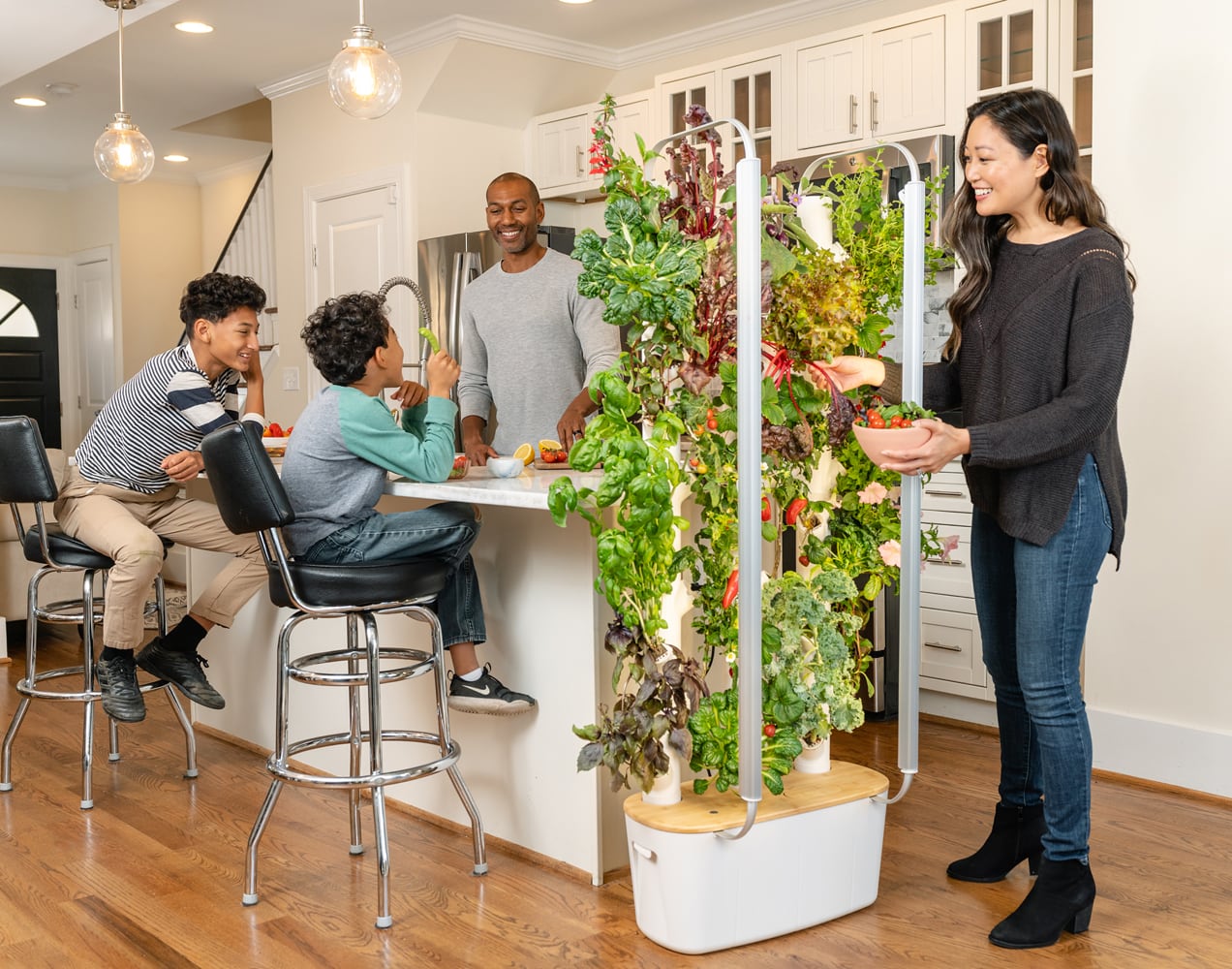
Launched at a time when COVID-19 renewed interest around the world for family-run, sustainable food supplies and home-based projects, the company flourished. Based in Bethesda, Maryland, Gardyn now employs a remote staff of more than 50 people.
The engines behind Gardyn’s success
We sat down with Ava, who’s in charge of their marketing and website. She first encountered Gardyn while working at a marketing agency they hired. She became absorbed by the mission and passion of Gardyn’s leadership team.
“I just fell in love with the company.” she said, “They wanted to bring marketing in-house and I didn’t want to leave. So I asked to stay and they hired me full time.”
Her passion is palpable — coming across more like a founder than a Head of Website.
Choosing WooCommerce
Ava was instrumental in selecting WooCommerce as their platform of choice. She doesn’t call herself a developer, but does have some experience with WordPress.
“The reason we chose WooCommerce is that it worked nicely with WordPress and it gave us the most flexibility. We didn’t want to have another cookie-cutter Shopify store. Shopify would be more of a pain to customize. I would definitely need a developer…and we didn’t have one.
But, because I did have experience with WordPress, though not much with WooCommerce, I was able to Google my way through creating our new website.”
The first iteration of their site was built completely in-house, using Elementor, and with no developers. It had everything they needed to get off the ground: a product detail page (PDP), membership functionality, and an intuitive shopping cart and checkout experience for customers.
“There were, of course, some growing pains,” says Ava. “Just trying to think ahead for scalability. We’d code something one way and two months later, we’d have to go back because I didn’t think further ahead.”
Luckily, WooCommerce gave Gardyn the flexibility to adapt quickly as the company soared in popularity — even from one month to the next.
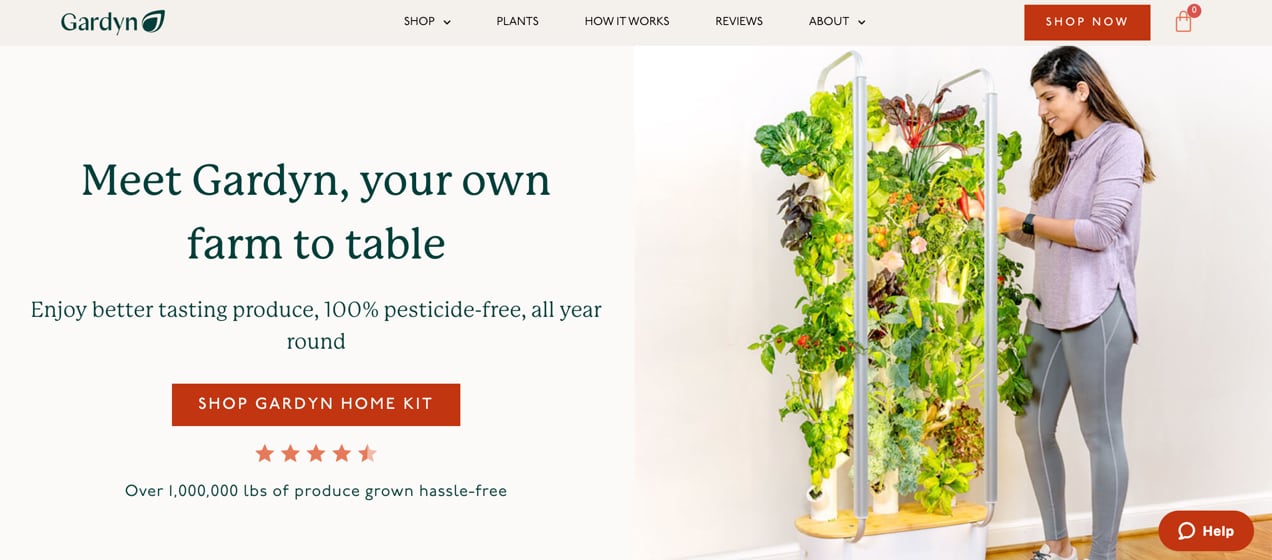
As the Head of Website, Ava keeps a close eye on metrics. “I want to see, if they land on the homepage, do they go to the PDP? Then from there, I like to see the PDP to “add to cart” rate, and then, obviously, add to check out. I just want everything to go smoothly through the funnel. Especially those key metrics — PDP to conversion, cart to conversion, checkout to conversion.”
A major way she’s found to improve those metrics is through customer reviews.
Featuring reviews with Trustpilot
One of the biggest challenges she has as a marketer is educating customers about exactly what Gardyn is and how it compares to other in-home food growing systems.
“It’s telling people that we have the Tesla, but if they’ve never driven, do they know what a Tesla is? So that’s been hard — explaining it in a way so they understand how it fits into their lives. It’s not just another chore or a hobby that’s going to go away. It’s just so easy and it’s always there.”
One of the best ways to overcome this problem, they discovered, is by utilizing user generated content (UGC), in the form of customer reviews. The Gardyn team saw the potential in reviews, but needed a platform that would consolidate reviews in one place. And it needed to be authentic.
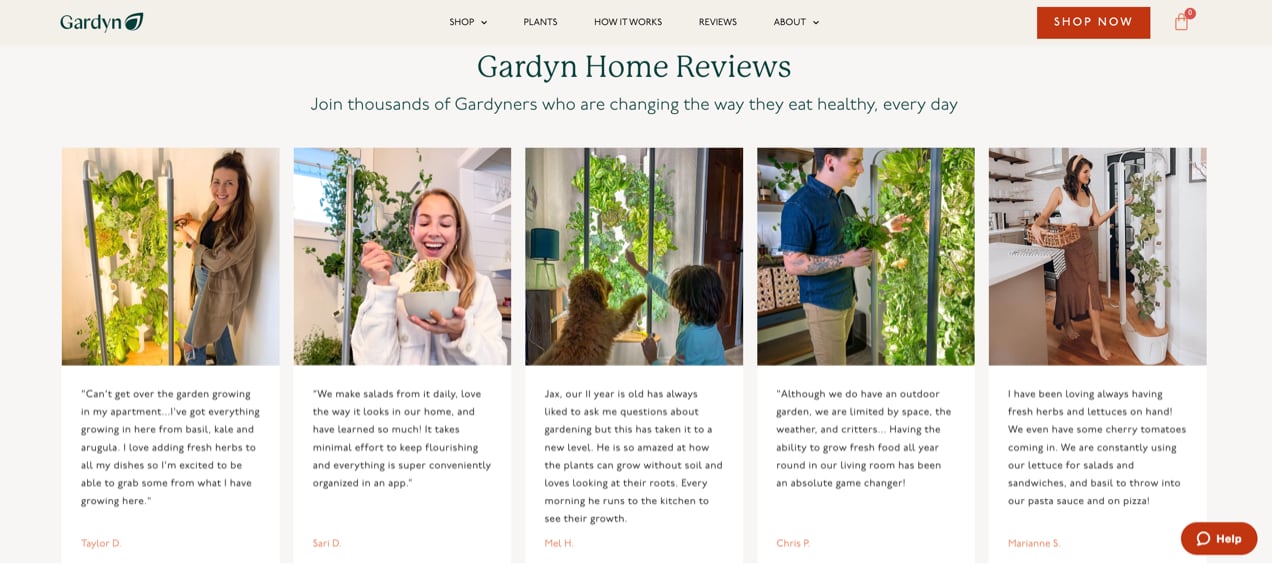
“Trustpilot is one of the tools that we’ve integrated that’s really made a big impact on sales and conversions on the website,” she says. “PR is harder these days, which is why reviews mean more.”
They started with another platform, but quickly moved over to Trustpilot, which has substantially increased the impact of reviews.
“It creates a sense of trust when customers can go to the Trustpilot site and see that the reviews and reviewers are real. And customers write detailed reviews with five stars. We’re not giving them any incentives, it’s just them wanting to tell us how much they love Gardyn.”
When it comes to getting reviews, Gardyn reaches out via email to individual customers who are actively engaged — like longtime members. They also reach out in a Facebook group, where people are collaborating and succeeding to to get the most use out of the system.
Trustpilot makes it easy to do more with the reviews they receive.
“The backend experience of Trustpilot is so much easier for us to manage, and see, and be able to download specific reviews and stuff like that. We’re able to reach out to reviewers, try to get photos, or get more stories for our blog to add that human feel and emotional connection.
We especially found it useful to create ads or review cards from within Trustpilot. I can download all of the SVG files really easily. Everything’s already set up with best practices in mind, so that’s really helpful.”
Including reviews on the site and in marketing has proven to be important.
“I did video user experience feedback where people went through the site and talked out loud about their experience and thoughts. I would say eight out of ten said something like, ‘Oh reviews! This is good.’ We also use testimonials in every email. In every footer, we include Trustpilot reviews — every single footer.”
In real-life, the results speak for themselves.
When Gardyn includes reviews in their Facebook ads, their click-through rate doubles. And when they added reviews to the site, engagement went up and bounce rates went down.
Using additional tools and integrations for success
Ava already mentioned that the choice to use WooCommerce for their store was, in part, due to the flexible nature of the platform. But how, specifically, does that manifest itself?
Extensions.
Ava has been able to utilize the large library of extensions to find quick solutions for anything she can dream up. It shortens the length of time it takes to launch new ideas and reduces development expenses.
“I’m self-taught, so I’ve learned to Google. I’ve learned to learn. You’re not going to know what extension works until you try it out. So the 30-day return policy is super helpful.
The great part is, that because WordPress is open source, and with WooCommerce on top of that, there are so many ways you can go. There are so many things out there, that you’ll find what you want. There’s always an extension for whatever I want to do.
For instance, we have a kit that includes four SKUs within a parent product. So we just used Product Bundles. I never could have coded that. Affirm, for buy now, pay later, has been great for us, too.”
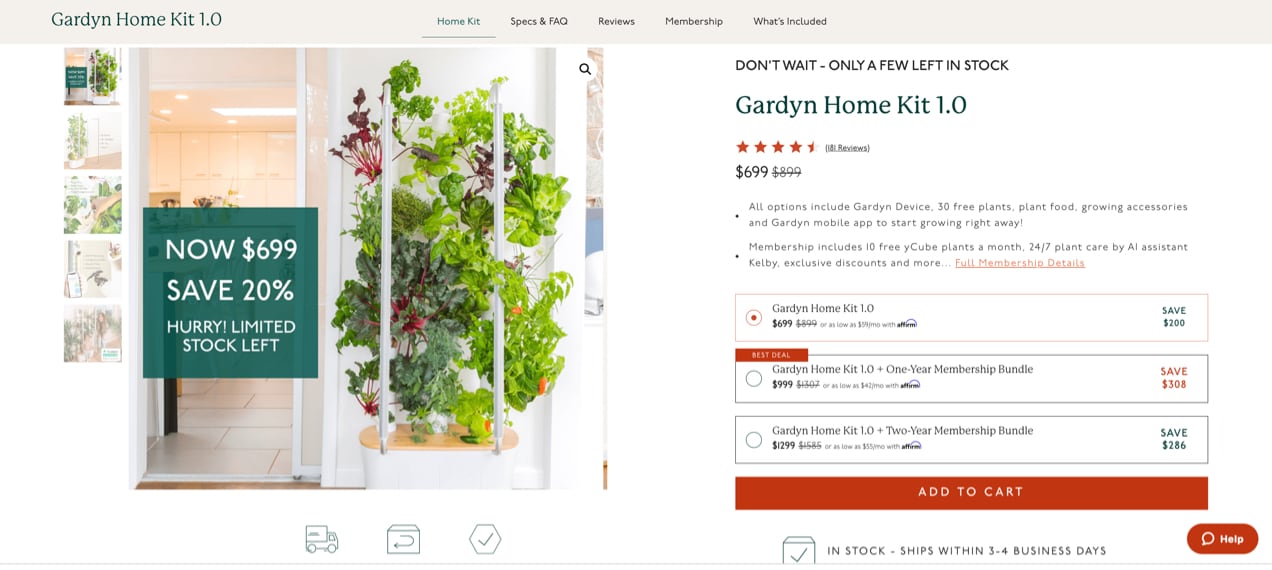
She says that Trustpilot and Affirm have definitely made the greatest impact on their site’s success.
And Klaviyo, for their email marketing automation platform, has been a game changer, tripling revenue from their abandoned cart funnel.
“It was super easy to integrate with WooCommerce. I don’t know why we didn’t use it before. Klaviyo just understands immediately what the funnel is. We actually doubled the number of contacts we capture from abandoned carts because Klaviyo can sync abandoned carts with a pop-up. I think we have close to 50,000 subscribers now.”
Implementing express pay
The MyGardyn website launched express pay options in November 2021 and immediately saw adoption by customers. A lot of adoption. Now, 40% of desktop transactions and 60% of mobile orders use express payments. As a tally of all transactions, 30% pay with a credit card, and 20% pay through Affirm.
But the big news is that they saw a 50% increase in mobile conversions compared to desktop during the same time period, making clear the importance of express payment options like Apple Pay, Google Pay, and Amazon Pay.
“It’s nice,“ says Ava, “The express pay options have really increased our conversion rates and mobile sales. The abandonment rate is really low, as well.”
Of the express payment options, Amazon Pay is one of the most popular.
“If you think about it, everyone has Amazon. So I just feel everyone’s like, ‘Oh yeah, I have it. I’m already signed into the app.’ It takes two seconds. I think the abandonment rate is 17% for that. It’s really low.”
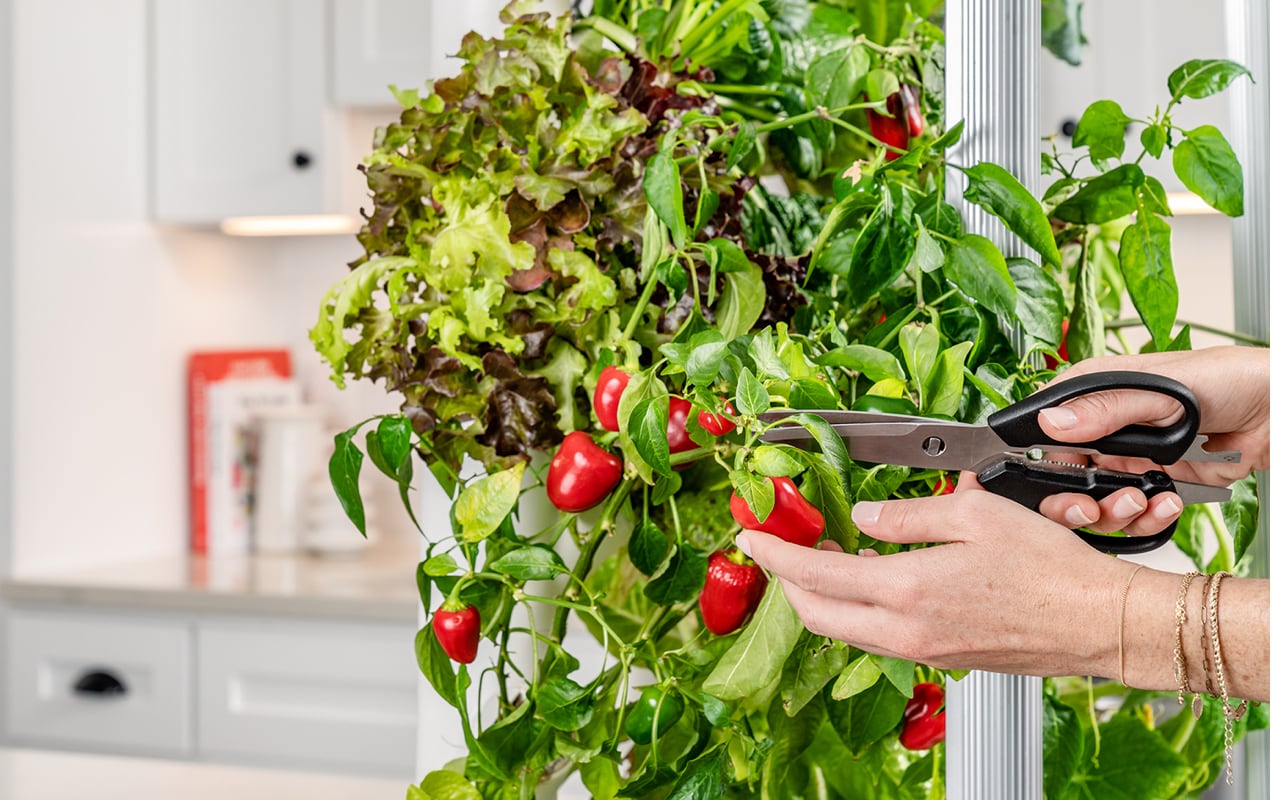
Looking toward the future
Gardyn aims to bring everyone access to fresh foods. A Gardyn in every home, of course, is the ultimate goal.
The company is currently working on a G3 Initiative, called Gardyn Grows for Good, working with schools and nonprofit organizations to bring food to food deserts and affected communities. This project ultimately helps provide healthy and affordable food to low-income areas.
When asked about advice she’d give others, she doesn’t hesitate.
“Don’t be afraid to make big changes,” says Ava. “A website is never done. It’s always growing. It’s always changing. Follow your gut, and follow the data, and I highly recommend WooCommerce and Trustpilot.
When you’re selling something or doing hardcore marketing, do it for something that makes the world better, and makes you feel good when people buy it.”
Finally, Ava also shared her favorite things to grow in her Gardyn: “My favorite thing is called Red Mustard. It’s really a spicy lettuce and it tastes like horseradish. It’s really good on sandwiches! I’ve also grown cherry tomatoes and strawberries that tasted so sweet. I’ve never tasted anything like that.”
